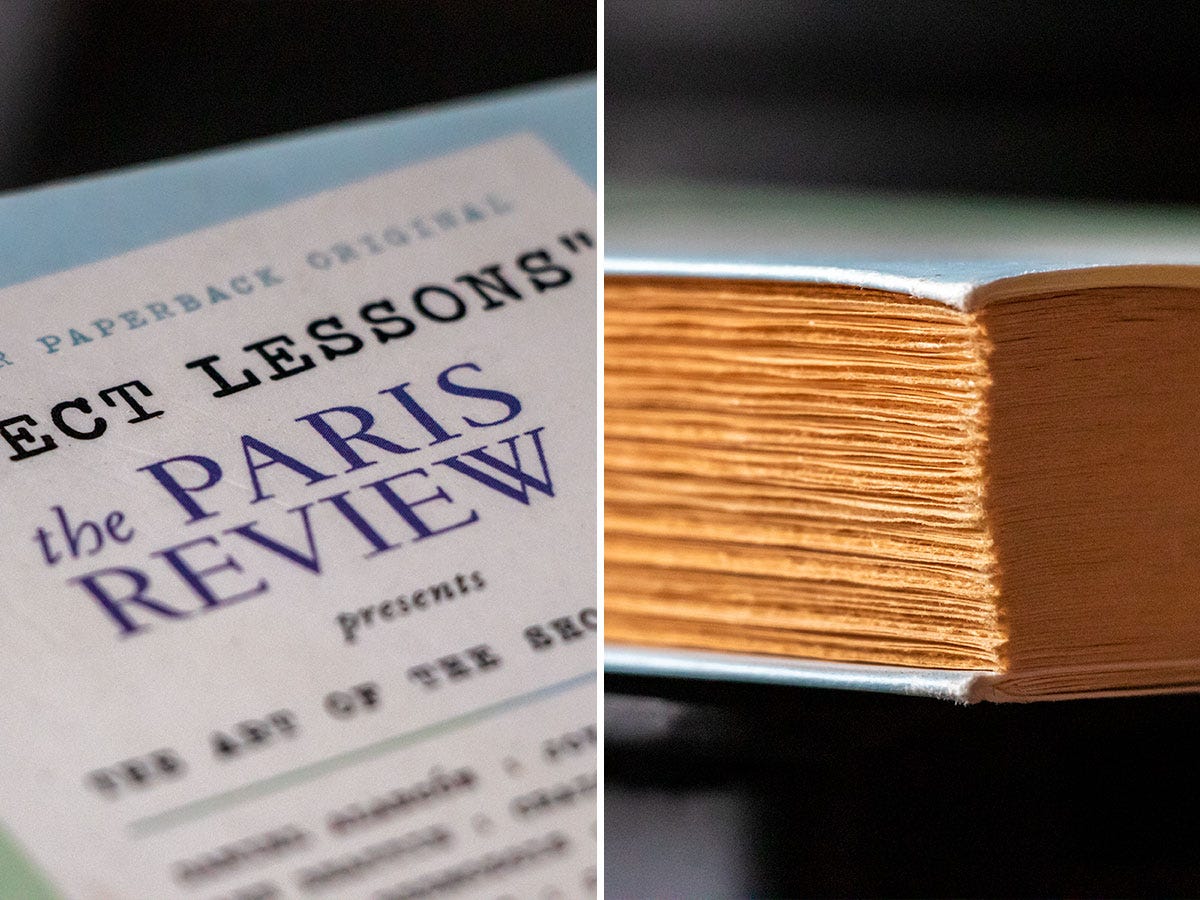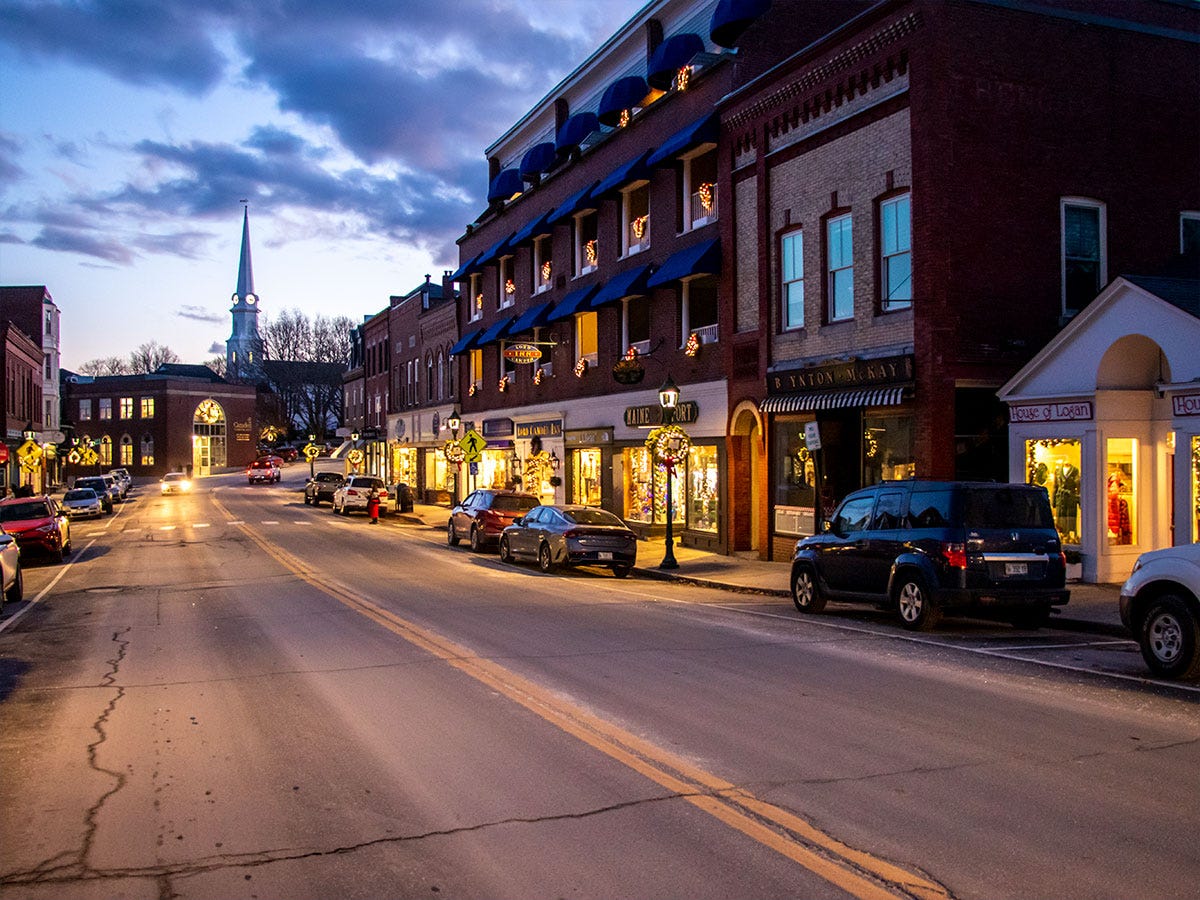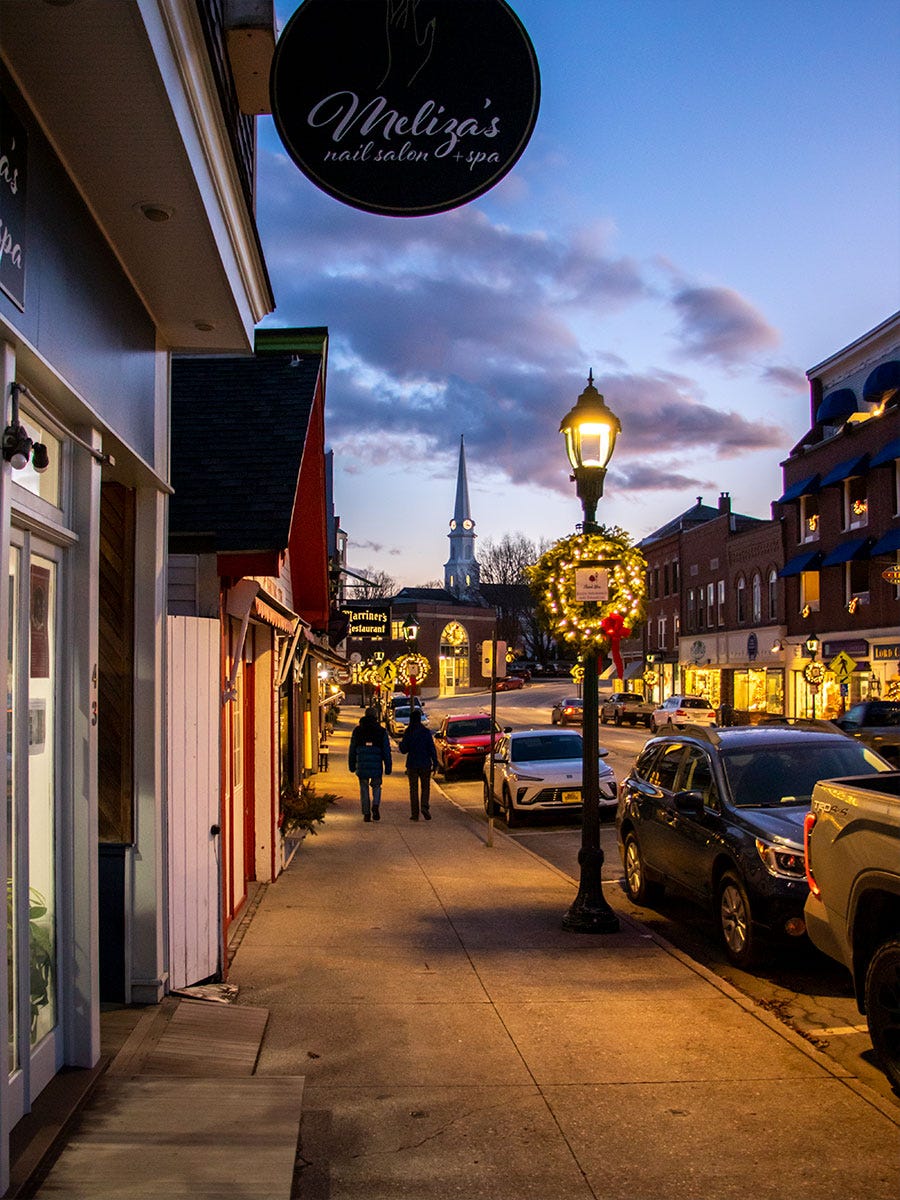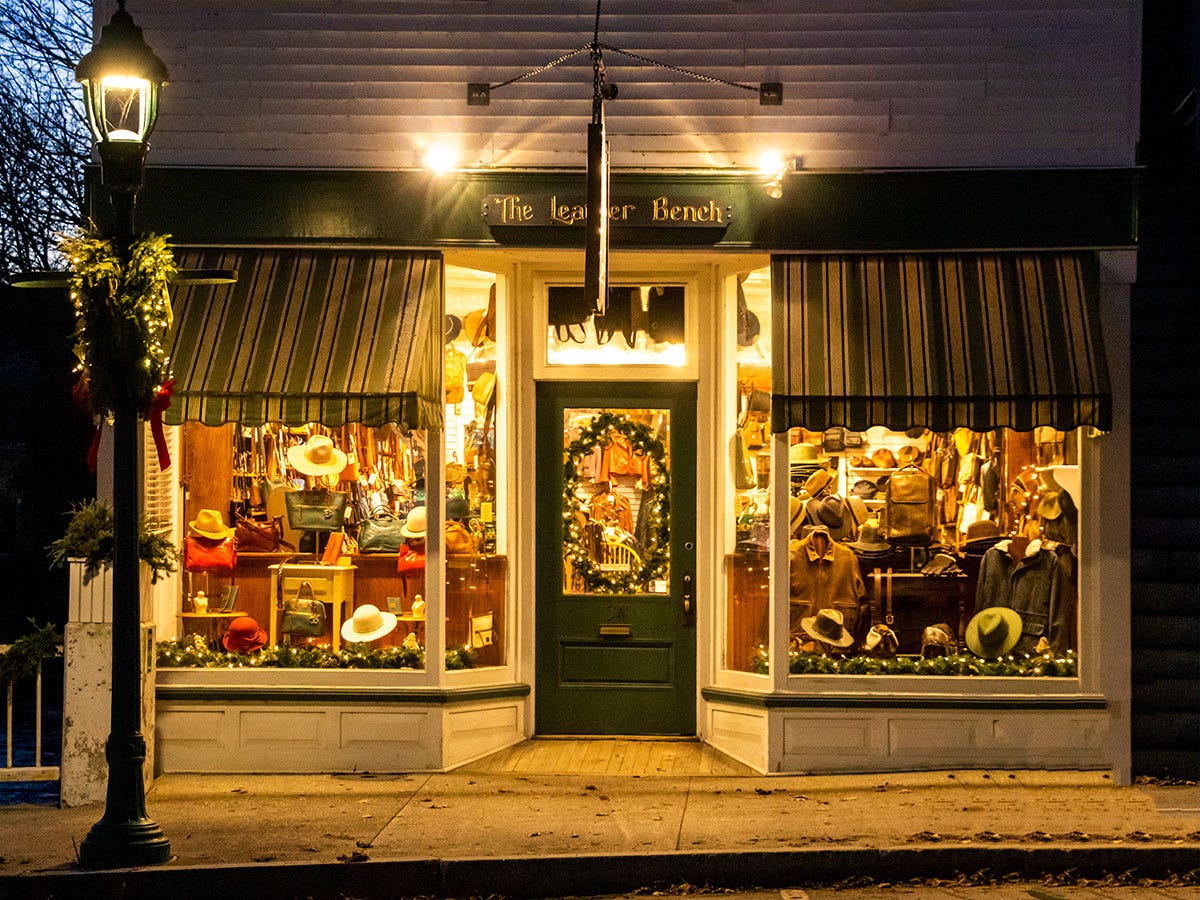Short stories are my favorite because they’re like song lyrics, an entire drama told with few words. And Camden, Maine is the epitome of coastal New England beauty. Especially at Christmas.
Laura and I have been visiting the Farmington Public Library on a weekly basis as of late. A few months ago, we decided to sign up for library cards; Laura’s had one in years past, but for one reason or another, it expired. It’s been a long time since we’ve been to the library to actually borrow books, but that’s all changed. It’s now become a thing. Even I now have my own library card. I’ve yet to use it though – the entire concept is strange to me. I’ve never been a big borrower. If I’d like to read a book, I’d like to read it on my own time. And on my own terms. I want to own it. To me, the idea of someone standing behind me on line waiting for the book I’m reading is unnerving. Laura is fine with libraries and everything that occurs inside of them. She’s been using them for years. She borrows books and movies and writes lists and remembers things. I can’t even have someone follow behind me while I’m driving down the road. I pull over to let them pass. The feeling of someone that close and in that relation to my position – it’s difficult to explain. It’s annoying. I don’t like it. It freaks me out. Mind you, some folks in the country like to drive fast, they like to tailgate – it’s best to let them pass. I have nightmares that someone is driving behind me with the intention of taking the book I’m reading away from me.
The reason I decided to talk about the library today is because I wanted to mention that while I haven’t been borrowing any books, I’ve certainly been buying them. And getting them for free. Apparently, libraries are full of books they no longer want. They have annual, bi-annual, and even monthly sales in attempts to rid themselves of these books. They charge next to nothing for them and most of the time ask for just a small donation. A month or two ago, Laura and I learned of such a sale and decided to visit. We bought a whole big stack of books for a few dollars and thought we were through. Just as luck would have it though, Farmington has yet to sell off all of their undesired inventory. The leftovers are sitting on racks near the circulation desk right this very moment. Each visit, as Laura looks for books to borrow, I look for books to own. One of the books I recently brought home is called, Object Lessons: the Paris Review. You have no idea how sophisticated I feel just typing this title. Anything with Paris in the name is flat-out fancy to me.
What is Object Lessons: The Paris Review?
What does it take to write a great short story? This book hopes to answer that question. It’s an interesting idea; present 20 short stories and then ask 20 authors (who aren’t related to the stories at all) to write lessons that precede each one. One author writes one lesson for one story. The book targets those who are either starting out with their own writing or those who have once written and who would like to return to it. It’s a nice book. I’ve enjoyed what I’ve read so far – the lessons are fun to read in and of themselves. They’re certainly not as fun to read as the stories are though, but perhaps they will be at some point. I’ve so far only finished reading two of the stories; Dimmer by Joy Williams (introduced by Daniel Alarcón) and Another Drunk Gambler by Craig Nova (introduced by Ann Beattie). Both stories were excellent and packed quite the punch. I just began City Boy by Leonard Micheals (introduced by David Bezmozgis). It’s a story of a young man who was unexpectedly “caught” with his girlfriend by her father. The young man ran and found himself wandering around New York City completely naked, until his girlfriend found him to return to him his clothes. It’s entertaining to say the least.

Short stories are near and dear to my heart. Why? Well, to start, they’re the only types of stories I’ve ever attempted to write. I don’t see myself as having the patience to write anything longer than a few thousand words. Also, I find that short stories are oftentimes more powerfully written than are novels. They’re forced to get to the point more directly and the writing style is oftentimes more interesting and more full of character. While writing a short story, an author can take liberties he or she wouldn’t otherwise take. Liberties such as being punchy. Like this. Here. Now.
A few evenings ago, Laura and I watched a movie called, Last Christmas that starred Emilia Clarke, Emma Thompson, and Henry Golding. During the first half of the movie, I thought I was watching some sort of romantic comedy. As the movie progressed though, a twist was introduced, which made the overall experience very rewarding. Ultimately, I enjoyed the movie. Why am I mentioning this? Because the soundtrack included songs performed mostly by George Michael. And one song in particular struck my fancy; Praying for Time.
George Michael: Praying for Time – Last Christmas
Have you ever read the lyrics of a song and found that an entire story was told through them? I have. It seems like Praying for Time is one of those songs and after reading through the lyrics, I found myself thinking of the short stories I’m reading in The Paris Review. City Boy in particular. Probably because that’s the one that’s currently top of mind.
Praying for Time
And it’s hard to love. There’s so much to hate. Hanging on to hope. When there is no hope to speak of. And the wounded skies above. Say it’s much, too much, too late. Well, maybe we should all be praying for time.
City Boy
I burned. Good death was killed. I burned with hate. A rabbi shook his finger, “You shouldn’t hate.” I lifted on my elbows, sneering in pain. She wrenched her hips, tightened muscles in belly and neck. She said, “Move.” It was imperative to move. Her parents were thirty feet away.
Novels may include passages such as those above, but they often don’t. There’s too much space in a novel, yet short stories are full of these types of passages. And song lyrics are basically nothing but them. I enjoy reading song lyrics. And short stories. I just wish there were more object lessons to accompany each.
What’s the moral of my story here in this post? Because Laura and I visited the library for library cards, I shopped for books. Because I bought the Object Lessons book, I read the short stories I referred to above. Because I read those stories, I recognized the similarities between them and George Michael’s song Praying for Time. And because I found those similarities interesting, I wrote about them here. And now you know about all of it. It’s odd how life works and how the transfer of what we know and care about is so effortlessly passed between us. I suppose that’s an object lesson in itself.
Camden, Maine
Around mid-December, Laura and I visited Camden, Maine. It was a quick visit that was intended to allow us to appreciate the crisp winter air and absorb the culture from the goings-on of the town. We enjoy taking trips like this one; they get us out of the house and they allow us to see how others are spending their time during the holidays. I know I’ve said this before, but it bears repeating; to us, the absolute best time of year to visit Maine’s most beautiful locations is during the winter. During January, February, and March, we plan to visit Camden again (for a lighthouse), Greenville (it’s been described as God’s country – thank you Brenda!), Lincolnville, Belfast, and Bar Harbor. We expect very few people to be around. We expect to experience the beauty of Maine and we expect to see things we’ve never seen before. That’s exciting to us.
I wrote a post that describes our visit to Camden. If you haven’t seen it, you may do so by clicking this link: Visiting Camden at Christmas. It’s a thorough post that allowed me to share a lot about the area, such as who lives in Camden, why it’s famous, what kinds of Christmas events are held in the town, and above all, lots of pictures of the Main Street and stores. If memory serves, there are 29 photos in this post. Some of them are even good. You’ll like it. Please give it a visit.
To make my offer somewhat enticing, I’ll share a few of my favorite photos from the evening. I think these capture the essence of Camden at Christmas rather well.




I’m not sure when we’ll get to these, but I’ve been eyeing a few locales south of Portland as well. Places such as Portsmouth, New Hampshire, York, a campground in Cape Neddick, Ogunquit, and of course, Kennebunkport. Add to that, Old Orchard Beach and Portland itself and I think we’ll be set. Basically, all the interesting towns south of Portland. Beach and camping towns. There’s so much to see.
One Space or Two?
My mother majored in English while attending the College of Mount Saint Vincent in the Bronx. From the moment I began speaking, she began correcting my grammar. I actually think she looked forward to me speaking just so she could do that. I’m thankful for it. Without her, I wouldn’t be where I am, in regards to my interest in vocabulary, speech, and grammar. I genuinely enjoy the English language and try to learn about it as much as possible.
A few weeks ago, my mother and I had a conversation about grammar. At one point, I asked if something she saw on the internet bothered her. It was a grammatical error that’s epidemic by this point. I mentioned that I’ve been seeing it all over the place and she responded that she’s been seeing it too. Neither of us was thrilled about how the error had grown like wildfire through social media and beyond. Somehow, after that discussion ended, we made it to the subject of how many spaces should be used after a period in a sentence. I personally use one. She insisted that two be used. And yes, we actually had this conversation. but I digress…
It’s strange, because up until that point, I hadn’t given this topic much thought. After speaking to her and then to Laura, who uses two as well, I find myself insisting on just one. What’s odd about the whole thing is that, as I said, I hadn’t ever given any of this much consideration. I really didn’t care. But now I find myself insisting on only one space being used. And for some reason, this insistence will now live in my brain forever. Language is weird like that. People like what they like. And if you try to change what they like, you’ll hear about it. I’ll tell you what I mean.
Have you ever corrected someone’s math? Or anything else that requires counting, for that matter?
This is a mistake that pertains to counting:
“How many blocks away is the movie theater?”
“Three blocks.”
“Hmmm…let me look that up. Actually, it’s only two.”
“Oh, my mistake. Sorry about that.”
This is a mistake that pertains to math:
“What’s two plus two?”
“Five.”
“No it’s not. It’s only four.”
“Oh, my mistake. Sorry about that.”
This is a mistake that pertains to grammar:
“Tell me about your family.”
“Well, I have a brother that’s taller than I am.”
“Who.”
“Who?”
“Yes, it’s who. You have a brother who’s taller than you. When speaking about a person, you use who, not that. That is left for inanimate objects. You have a friend who is smart and a car that is fast.”
“I hate you. We are no longer friends. Please leave my sight before I beat you to a pulp.”
It’s true. Even if you’re as kind as the pads on a kitten’s feet, you’ll never get away with correcting anyone’s grammar who’s not in your immediate family. And even then, your family will take offense. Why is this? I wish people would correct me. I constantly ask readers if I’ve made typos or grammatical errors in my posts. I know I do. I know I screw things up. I can generally get by, but there are bound to be mistakes, especially with tenses. I’ve never been good at keeping them consistent from one sentence to the next. Tenses and something about participles. I don’t even know what those things are. But anyway, if I make a mistake, I need to learn about it and fix it.
I don’t know – I guess it really doesn’t matter. We all know what each other is trying to say and as long as we get along, that’s good enough for me. I do enjoy learning about it though and the little I know, I like to pass on. It hasn’t made me any friends, however, I’ll tell you that.
Back to spaces after the period. I looked it up (this is going to get me in trouble). Here’s what I found. Apparently, the verdict is split.
According to every major style guide in both academic and business writing, one space is recommended after a period or other punctuation mark at the end of a sentence.
And…
From around 1950, single sentence spacing became standard in books, magazines, and newspapers, and the majority of style guides that use a Latin-derived alphabet as a language base now prescribe or recommend the use of a single space after the concluding punctuation of a sentence.
But wait…
The nation was rocked this week by a paradigm-shattering study: Science has definitively found that two spaces after a period in typed text provides the most efficient reading experience for readers.
Interestingly enough, if you place two spaces after a period, people can apparently read what you write 3% faster than they would if only one was used.
I even watched a video where five people were interviewed about how many spaces they place after a period. Four of them said they use two. I’m beginning to think I’m in the minority.
After learning all this, I approached Laura to ask why she uses two spaces after a period. She told me it was because that was what she learned in typing class in high school. You see, I never took a typing class. I first learned to type on a laptop I bought while attending college in 1996. I taught myself. I never typed a thing before that.
I asked Laura the age of her typing teacher when she took the class. Laura told me the teacher was probably around 50 years old. This leads me to believe that Laura’s typing teacher first learned to type on a typewriter. And when someone learns to type on a typewriter, they’re instructed to use two spaces after a period. And that instruction sticks. I’m much more liberal with my spacing because I was never taught to do anything. Until my later years in college, that is, but by that point, spacing wasn’t a big deal. I did have a fellow student once tell me to use two spaces though. We were working on a paper together. He was glancing over my shoulder as I typed. After he made his request, I gave him an irksome look and he never suggested it again. Who was this guy anyway? He was younger than I was. Weird, this spacing thing is.
What I shared above is nothing more than speculation. I have no idea why people use one or two spaces after a period. I do, however, know that people are very particular about which they use. I ask you though, if you have experience with this, please let me know. Why do you use one space? Why do you use two? And what would you do if you met someone who uses three?
PS – I took this photo a few days ago. I thought I’d post it here. It’s Clearwater Lake in Industry, Maine. It’s one of the prettiest lakes anywhere. See if you can spot the Christmas tree.

This brings me to the end of another post. I sincerely hope you enjoyed it and, if so, I invite you to leave a comment down below to let me know your thoughts. It’s always nice to get feedback on the things I share.
Below are a few questions I’d like to ask you:
- Would you like to receive these posts via email? If so, you can sign up here. I send out a new post every single Monday morning, bright and early.
- Are you new here? Are you interested in reading through my entire list of posts that go way back? If so, you can start right here.
If you did any of these things, I can tell you right now that you’d truly make my day. Thank you so much and with that, I say adieu. Or at least, until next time.
PS – Can you do me a huge favor? Can you please share this page with someone you think might enjoy it? Here are some links to help you do that. Thank you!

Leave a Reply